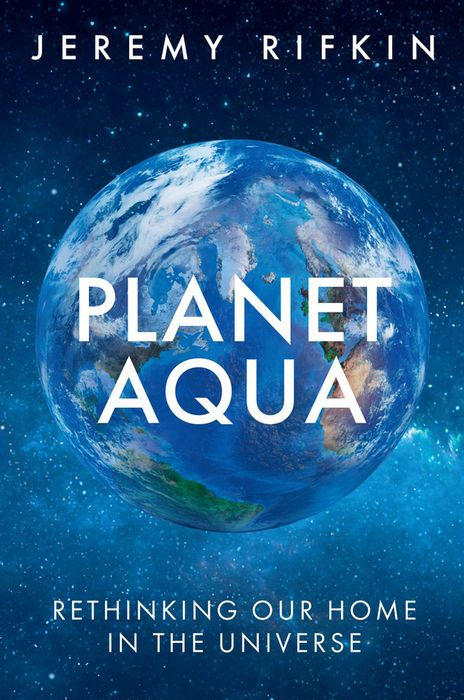Grappling with the realities of climate change goes hand-in-hand with protecting an essential resource: water. In his new book, Planet Aqua: Rethinking Our Home in the Universe, economic and social theorist Jeremy Rifkin urges a complete rethink of our relationship with water. He sees the need for a ‘Blue Deal’ to complement the EU’s Green Deal.
Rifkin, known for his ‘third industrial revolution’ – a sustainability concept that looks to address economic instability, energy security and climate change – insists that a Blue Deal is essential to ensure the EU's resilience in an era of ecological instability.
The European Economic and Social Committee (EESC) agrees, renewing its call for a dedicated EU Blue Deal. In a recent opinion paper the EESC, which represents employers, workers and civil society groups, warns that conflicting industrial and environmental demands make a standalone strategy for water resilience essential.
 Planet Aqua book by Jeremy Rifkin
Planet Aqua book by Jeremy Rifkin
The need for a Blue Deal
Europe’s water crisis is no longer hypothetical; it is visible and escalating. Climate-induced weather extremes threaten its water systems. Events such as the devastating floods in Spain, and the Rhine and Danube rivers bursting their banks, underscore the problem. As climate change intensifies, droughts and flash floods are becoming common, disrupting local communities, agriculture and key industries.
In Planet Aqua, Rifkin argues that these crises are not simply isolated events but symptoms of a larger “mismanagement of the hydrosphere” – the planet’s vast network of water. He warns that we face not only a climate crisis but also a water crisis with serious consequences for public health, biodiversity and economic stability.
Rifkin envisions a Blue Deal that shifts from treating water as just another resource to recognising it as the foundation of life and society. He argues that the EU's Green Deal won’t succeed without a corresponding Blue Deal that prioritises water resilience and resource preservation.
“While fossil fuels lit the fuse, it’s the hydrosphere that’s ringing the death knell,” he tells The Parliament.
What is a blue economy?
A Blue Deal would support the growth of an economy built around water ecosystems. Unlike other economic models, the blue economy focuses on sustainable water management practices, recognising that sectors like agriculture, energy production and manufacturing rely heavily on water.
This approach stresses that water resources deserve protection and sustainable management, from source to sea. EESC rapporteur Florian Marin underscores this vision: “Water resilience must be widely integrated into all relevant EU policy areas,” he tells The Parliament.
According to a recent Eurobarometer survey, 78 per cent of Europeans support additional EU measures on water resilience, with top concerns being water pollution, overconsumption and hazardous chemicals.
Strengthening water resilience
Rifkin’s thesis is simple but often overlooked: climate change is about more than just carbon. The hydrosphere plays a central role, connecting climate, industry and ecosystems.
In this vein, 21 EU member states, led by Portuguese Minister of Environment and Energy Maria da Graça Carvalho, have urged the European Commission to make water a top priority. In a letter, they call on the EU executive to take “concrete action” to “boost water security and resilience across the European Union.”
The European Commission’s Water Resilience Strategy reflects the need for sustainable water management as the foundation of the bloc's future industrial and environmental strategies. ‘Sustainable’ means adopting practices and technologies that conserve water, reduce waste and adapt to climate impacts, helping to maintain a reliable supply of water.
Technology is only part of the answer
The European Patent Office reports that it leads globally in the development of water-related technologies, with 40 per cent of patents – such as those for efficient water treatment – coming from European applicants.
The EESC points out that technology alone will not solve the water crisis. Building public engagement and training a workforce equipped with water management skills matter just as much. These ‘blue jobs’ range from water engineers and spatial planners to legal and financial experts who understand sustainable water management. Corresponding policies, which the EESC advocates for from the EU down through national to regional level across the bloc, could encourage industries to adopt water-efficient technologies and train professionals to oversee and manage sustainable practices.
“It is important to revise how we are using public money in relation to water,” Marin says, pointing to the common agricultural policy as an example of EU funds getting distributed without requirements for sustainable water practices.
Rifkin’s Planet Aqua serves as the philosophical underpinning to the EESC’s Blue Deal proposal. As the EU plans for the future, Planet Aqua has a clear message: Water is the EU’s next climate battleground, and the Green Deal’s success may hinge on turning green policies blue.
Sign up to The Parliament's weekly newsletter
Every Friday our editorial team goes behind the headlines to offer insight and analysis on the key stories driving the EU agenda. Subscribe for free here.